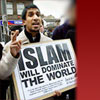Muslims unite! A new Reformation will bring your faith into the modern era
20 Dec, 2006
The Times( UK), August 11, 2005
WHEN Sir Iqbal Sacranie, head of the Muslim Council of Britain,
admitted that “our own children” had perpetrated the July 7 London
bombings, it was the first time in my memory that a British Muslim
had accepted his community’s responsibility for outrages committed
by its members.
Instead of blaming US foreign policy or “Islamophobia”, Sacranie
described the bombings as a “profound challenge” for the Muslim
community. However, this is the same Sacranie who, in 1989, said
that “Death is perhaps too easy” for the author of The Satanic
Verses. Tony Blair’s decision to knight him and treat him as the
acceptable face of “moderate”, “traditional” Islam is either a sign
of his Government’s penchant for religious appeasement or a
demonstration of how limited Mr Blair’s options really are.
Sacranie is a strong advocate of Mr Blair’s much-criticised new
religious hatred Bill that will make it harder to criticise
religion, and actually expects the new law to outlaw references to
Islamic terrorism. He said as recently as January 13: “There is no
such thing as an Islamic terrorist. This is deeply offensive. Saying
Muslims are terrorists would be covered [ie, banned] by this
provision.” Two weeks later his organisation boycotted a Holocaust
remembrance ceremony in London, commemorating the liberation of
Auschwitz 60 years ago. If Sir Iqbal Sacranie is the best Mr Blair
can offer in the way of a good Muslim, we have a problem.
The Sacranie case illustrates the weakness of the Government’s
strategy of relying on traditional, but essentially orthodox,
Muslims to help to eradicate Islamist radicalism. Traditional Islam
is a broad church that certainly includes millions of tolerant,
civilised men and women, but also encompasses many whose views on
women’s rights are antediluvian, who think of homosexuality as
ungodly, who have little time for real freedom of expression, who
routinely express anti-Semitic views, and who, in the case of the
Muslim diaspora, are — it has to be said — in many ways at odds with
the (Christian, Hindu, non-believing or Jewish) cultures among which
they live.
In Leeds, from which several of the London bombers came, many
traditional Muslims lead lives apart, inward-turned lives of
near-segregation from the wider population. From such defensive,
separated worlds some youngsters have indefensibly stepped across a
moral line and taken up their lethal rucksacks.
The deeper alienations that lead to terrorism may have their roots
in these young men’s objections to events in Iraq or elsewhere, but
the closed communities of some traditional Western Muslims are
places in which young men’s alienations can easily deepen. What is
needed is a move beyond tradition — nothing less than a reform
movement to bring the core concepts of Islam into the modern age, a
Muslim Reformation to combat not only the jihadi ideologues but also
the dusty, stifling seminaries of the traditionalists, throwing open
the windows of the closed communities to let in much-needed fresh
air.
It would be good to see governments and community leaders inside the
Muslim world as well as outside it throwing their weight behind this
idea, because creating and sustaining such a reform movement will
require, above all, a new educational impetus whose results may take
a generation to be felt, a new scholarship to replace the literalist
diktats and narrow dogmatisms that plague present-day Muslim
thinking.
It is high time, for starters, that Muslims were able to study the
revelation of their religion as an event inside history, not
supernaturally above it.
It should be a matter of intense interest to all Muslims that Islam
is the only religion whose birth was recorded historically, its
origins uniquely grounded not in legend but in fact. The Koran was
revealed at a time of great change in the Arab world, the
7th-century shift from a matriarchal nomadic culture to an urban
patriarchal system. Muhammad, as an orphan, personally suffered the
difficulties of this transformation, and it is possible to read the
Koran as a plea for the old matriarchal values in the new
patriarchal world, a conservative plea that became revolutionary
because of its appeal to all those whom the new system
disenfranchised, the poor, the powerless, and, yes, the orphans.
Muhammad was also a successful merchant and heard, on his travels,
the Nestorian Christians’ desert versions of Bible stories which the
Koran mirrors closely (Christ, in the Koran, is born in an oasis,
under a palm tree). It ought to be fascinating to Muslims everywhere
to see how deeply their beloved book is a product of its place and
time, and in how many ways it reflects the Prophet’s own
experiences.
However, few Muslims have been permitted to study their religious
book in this way. The insistence within Islam that the Koranic text
is the infallible, uncreated word of God renders analytical
scholarly discourse all but impossible. Why would God be influenced
by the socioeconomics of 7th-century Arabia, after all? Why would
the Messenger’s personal circumstances have anything to do with the
Message?
The traditionalists’ refusal of history plays right into the hands
of the literalist Islamofascists, allowing them to imprison Islam in
their iron certainties and unchanging absolutes. If, however, the
Koran were seen as a historical document, then it would be
legitimate to reinterpret it to suit the new conditions of
successive new ages. Laws made in the 7th century could finally give
way to the needs of the 21st. The Islamic Reformation has to begin
here, with an acceptance that all ideas, even sacred ones, must
adapt to altered realities.
Broad-mindedness is related to tolerance; open-mindedness is the
sibling of peace. This is how to take up the “profound challenge” of
the bombers. Will Sir Iqbal Sacranie and his ilk agree that Islam
must be modernized? That would indeed make them part of the
solution. Otherwise, they’re just the “traditional” part of the
problem.


